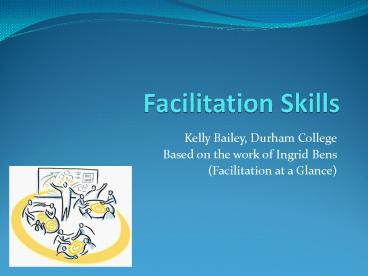Facilitation Skills - PowerPoint PPT Presentation
1 / 16
Title:
Facilitation Skills
Description:
Kelly Bailey, Durham College Based on the work of Ingrid Bens (Facilitation at a Glance) Today s plan This session is designed to develop facilitation skills among ... – PowerPoint PPT presentation
Number of Views:378
Avg rating:3.0/5.0
Title: Facilitation Skills
1
Facilitation Skills
- Kelly Bailey, Durham College
- Based on the work of Ingrid Bens
- (Facilitation at a Glance)
2
Todays plan
- This session is designed to develop facilitation
skills among college leaders - Kelly Bailey, Human Resources, Durham College
- Defining facilitation
- Facilitator stance
- Core practices
- Preparing to facilitate
- Facilitator language
- Meeting management
- Supporting participation
3
Introduction
- On one side of your card, write what you hope to
GAIN from this workshop - On the other side, write a list of words that you
think characterize facilitator/facilitation - Find the other person who has the same colour
dot/triangle on their card as you do, and form a
pair - Share what you have written on your cards
4
Goals of facilitation
- Facilitators focus on PROCESS, not content
- Facilitators help groups to achieve THEIR (the
groups) goals - Facilitators help groups to build skills in
communication, problem-solving, conflict
management, decision making - Facilitators support the development of
leadership within the group - See top of p. 3 in handbook
5
Why facilitation skills for leaders?
- Leaders who use facilitative techniques and
approaches - Are transparent
- Show integrity and respect for others
- Ensure equal voice and encourage diversity
- Encourage innovation through exploration
- Are clear about accountability for themselves and
their team members - Develop team members skills, which supports
sustainability and development
College Values?
6
The facilitator stance
- Facilitators do
- Help the group define its goals
- Suggest processes and tools to assist the group
to move toward their goals - Monitor interactions, intervening as appropriate
to support continued progress - Provide a container and strategies that assist
in consensus building and equity of participation - Control the process of the meeting
- ASK the group how they want to proceed
- Facilitators do NOT
- Interject their own opinions
- Judge others contributions in relation to
content - Interrupt when the process is going well
- Control the content or decisions of the group
work - Monopolize the conversation
- Make decisions on content for the group
- TELL the group how they should proceed
7
Core Skills Activity
- See core skills descriptions pp. 5-7
- Your pair will be assigned 1-2 skills read the
descriptions in the handbook - Summarize each skill in one sentence, on chart
paper provided - Plan to present your work to the group
8
- Time for Check-in
9
Before facilitating
- Interview event coordinator (or yourself)
- Why facilitation?
- Goals of event
- Potential issues
- Empowerment level (see p. 90-94)
- Consider checking with event participants via a
survey or interviews - Create a draft design obtain feedback revise
- Have alternate plans, extra process tools in mind
- See pp. 50-51 for more details
10
Facilitator language
- Paraphrasing (mirroring)
- Reporting behaviour
- Describing feelings
- Checking perceptions
- More info on pp. 10-11
- Facilitator best worst practices p.18-19
- read aloud to each other, taking turns
Ask, dont tell!
11
Meeting management
- In your new pair, brainstorm a list of meeting
stoppersbehaviors that hinder success at
meetings - Complete the symptoms and cures matching task
- Check your answers on p. 137
12
Meeting management
- To assist a dysfunctional group have better
meetings - Distribute the group behaviours lists (pp. 105)
- Encourage everyone to use the lists during a
meeting, to make silent observations - Collectively create 2 lists
- Things we do well and should do more of
- Things we do that hinder success and we should
seek to reduce
13
Barriers to participation
- Create a list, with your partner, of things that
might prevent people from participating fully in
a facilitated event - See creating participation pp. 69-75
14
Barriers to participation
- For full participation, people must
- Feel relaxed
- Understand the topic
- Have had some say in the planning
- Feel committed to the topic
- Have the required information
- Feel safe
- Not feel influenced
- Have confidence in the facilitator
- Are comfortable in the meeting room
- Feel the organization will take action on their
ideas - How can we ensure these criteria are in place?
Brainstorm 1-2 ideas per item, with your partner
15
Summary activity
- Think-pair-share with your original partner
- What is the most valuable thing you learned
today? - How do you see yourself using facilitation skills
- Faculty?
- Program Coordinator?
- Associate Dean?
- Dean?
16
- Recommended resource
- Facilitation at a Glance! 3rd Edition
- Your Pocket Guide to Facilitation
- Ingrid Bens, M.Ed.
- www.MemoryJogger.org
- 1.800.643.4316































